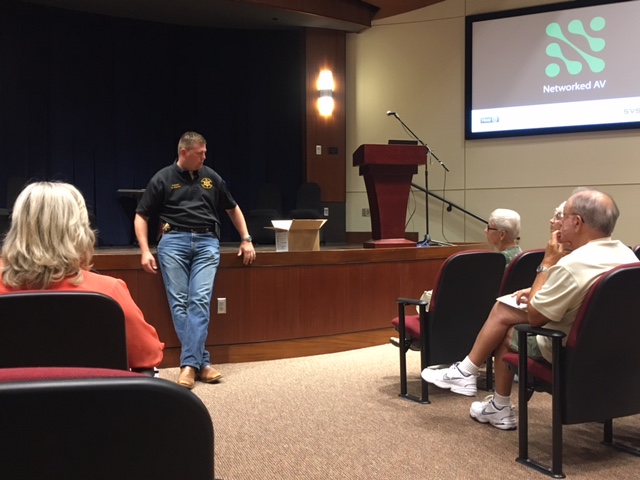Sheriff Gentry addresses the WaLLi class at Wallace State on Wednesday, June 28, 2017. / W.C. Mann
HANCEVILLE – Cullman County Sheriff Matt Gentry visited Wallace State Community College on Wednesday to speak to participants in the Wallace State Lifelong Learning Institute (WaLLi) senior continuing education program about various scams that might target them.
First up was a discussion about phone scams Gentry explained how scammers acquire and use citizen’s phone numbers to target them. He shared how criminals can go online to mask the actual point of origin and number from which they call, and can even make a call from another state appear to originate from within the victim’s own area code.
Gentry said some of the common phone scams are:
- Fake IRS delinquent tax notices that may appear to originate from Washington D.C., demanding immediate payment over the phone.
- Fake sweepstakes announcements that require the “winner” to pay a certain amount of money up front to collect the prize.
- Fake charity calls requesting donations to organizations that may not exist.
Gentry advised, “This is the thing: if somebody calls and wants money, it’s probably a scam. If somebody that you don’t know calls and wants to solicit personal information from you, it’s a scam. If the Publishers’ Clearing House calls and says ‘You just won $2 million, and if you’ll send us $500 , then we’ll send you your check,’ this is always my response, ‘You bring me the $2 million in cash, and I’ll cut you $500 out of it.’”
Gentry advised students not to give out personal information over the phone, even to callers who claim to represent an organization with whom the student regularly does business. Because so many organizations are set up for online business, the sheriff advised people to go to those sites instead.
Addressing online scams, Gentry gave particular attention to a growing scam on Facebook, in which criminals use fake or hacked profiles to solicit money or personal information from “friends.”
“It’s hard to convince people that it’s not real,” said Gentry, “because they will tell you stuff, and they will play off your emotions.”
Another kind of scam is a bank scam. In a scenario Gentry described, the victim receives a check in the mail for a large sum of money, and is told to deposit the check in his or her bank account while getting a small portion back in cash. The victim is told the cash should immediately be sent or wired to an address included with the check. If the victim follows the instructions, the criminal will have the cash up to a day before the bank discovers that the check is a fake.
Gentry warned, “You’re the one that owes $2,500 to the bank, because you’re the one that went and took it. It’s a scam that hits people every day. I always tell people if it’s too good to be true, then it is false; it’s not real.
About door-to-door scams, Gentry described situations in which a stranger comes to the victim’s door with a claim of car trouble or some other issue, in an attempt to gain entry to the house. Once inside, the criminal looks for targets of opportunity that might be taken unnoticed from a homeowner whose attention is diverted even for a moment: cell phones left on a table, checks from the back of an exposed checkbook, and others.
“Don’t even open the door,” Gentry advised. “Tell the young lady that you’ll call the Sheriff’s Office for her. Most of the time–99.9 percent–you’re going to see that young lady going somewhere else, because she don’t want to be there when the Sheriff’s Office arrives.”
In addition to the phone scams seeking donations to fake charities, mentioned earlier, Gentry also advised his audience to beware of letters seeking donations by mail, as many of these are not legitimate charities. He also told students to watch carefully for people seeking handouts, if they show up regularly to the same locations. In many cases, these people have no real need, and are simply scamming kind-hearted citizens for money that could better be given to known and reputable services.
“They’re playing off our emotions,” said Gentry. “If I donate money, I donate money to people that I know and to groups I know, so I know where the money goes.”
The sheriff’s final notes to the class included tidbits like:
- Sign checks and documents in blue ink, which is more difficult to photocopy than black ink.
- Use credit cards instead of debit cards to limit access from the receiving end to one’s bank account information. Gentry was adamant, though, that when credit cards are used, their balances should be entirely paid off each month.
- Keep a close eye on even small expenditures from your checking account or credit card. Some criminals get their money by taking small amounts of money from a lot of people.
- Examine the card reader on the gas pump you use, to see if it looks odd or overly thick. Criminals will attach “skimmers” to card readers to harvest information as cards are swiped. Pulling lightly on a reader will usually detach a skimmer. The sheriff warned students not to yank hard on every card reader, as damage could result.
For more information on Wallace State’s WaLLi program, contact Mandi Perkins at 256-352-7826, email mandi.perkins@wallacestate.edu, or visit www.wallacestate.edu/ce.




















